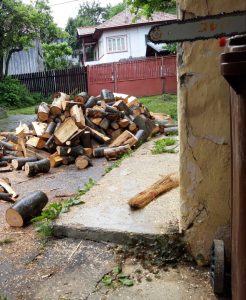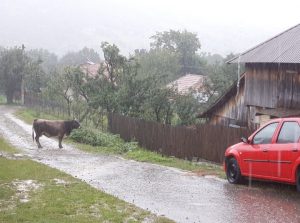Plastic rules the world
In our project we are concerned with “teaching” children how to recycle, pointing them out what trash belongs where, what effects all the trash has on the environment, what happens to the trash when it is not sorted accordingly. We have implemented various activities in the schools in the area. We have built trash bins with students from the lower classes and discussed the different types of trash to them. In a playful way we tried to convey this knowledge, non formal education, of course.
In the higher classes we concentrated on the concrete influence of the individual in this context of environmental protection. With the students we watched videos that deal with the topic. We also talked about ways of living “greener”.
I am convinced that with our project we had an influence on the students.
But, I go into a super market, which one doesn’t matter. There I can buy organic vegetables, which are packed in plastic, so that they don’t come into contact with the other vegetable, which is called inferior. I can buy electronic devices for a low price, whose packaging (made of plastic, of course) is so complicated to open, that I have to buy scissors to open it, made of plastic, of course. (I don’t want to talk about the manufacturing process of the devices at this point, that would lead too far.) When I have slowly filled my shopping cart with stuff to eat, go to the bathroom and load my fancy mobile phone, my shopping cart is already so full of plastic that I would like to leave it standing. But, according to maslow’s pyramid of needs, I have to, at least eat and go to the bathroom. So I buy all the stuff and I am happy that I have saved a little money because the supermarket is so crassly cheap. Of course I forgot my various jute bags, so I have to buy plastic bags. Also due to the fact that the charming cashier doesn’t let me use the carton box I found in his well-assorted supermarket. I could at least burn the box without a guilty conscience. Well then, I have to eat.

The supermarket is an indication of how far we have come in terms of environmental protection. And it doesn’t matter whether it’s a supermarket in Germany or Romania. Plastic is everywhere. The companies market themselves as green companies, because it is socially desirable and the managers try to get good promo. But the content of the supermarkets reflects a different picture.
As I said, in our project we try to draw attention to a conscious life in the environment. But large companies are always pointing out limits to me. Of course I can teach the children to recycle things and talk to them about the environment. But it doesn’t reduce the amount of plastic produced. So we need to fight the causes. I do not believe that the market regulates itself. That is a neo-liberal misbelief.
So should politics set limits on the market? I am in favor of it. But that demands voters. People hate laws. I can fully understand that. But something has to happen.
I can shop in a fancy shop that sells stuff without packaging. But I don’t find it in rural Romania or Germany. For that I would have to drive into a city. And since there is no bus after 20h, I would have to go there with my diesel and shop in a shop that I can’t afford. So I would contaminate the environment with my diesel, as well as what I find worse as a selfish person (sorry environment)! Because I can’t do my weekly shopping in this shop. So i would starve!
I have no recipe to solve this problem. Maybe time will heal all wounds and in 50 years there will be no more plastic packaging. In any case, it makes a lot of sense to make the people (in my case young people) aware of the environment, to be more attentive and to consciously separate the trash. Even if it doesn’t affect the owner of the supermarket and he doesn’t change his behavior.
After all, the young people’s consciousness is changing and more and more people are going on the streets. Well, a start!
My reflection about the competition of essays
Since the end of January I have been in Romania within the framework of an EVS in the organisation Curba de Cultura. And thus also in a project called BYSC-E, in which there are two more volunteers, with whom I also share a house.
Now about 8 months have passed and we have organized many different projects and events.
The basic idea of the project is to teach children and young people about environmental issues. But apart from imparting knowledge, it is also (and above all) about rising awareness towards topics such as recycling, environmental pollution and one’s own ecological behaviour. The mediation takes place in schools and outside the schools.
In the course of time we have planned and carried out many “school lessons”. But our didactic plan differs from that of the school. We focus on non-formal education and structure our lessons accordingly.
We go to schools and build bins with the young people in which they can separate the trash and we talk to the pupils about recycling and the responsibility of each individual. This usually takes place in the lower grades.
We try to convey knowledge in an interesting and appropriate way for the target group, through games or interactive design.
We also offer many activities outside the school. On World Environment Day, for example, we have organized an exhibition and a debate in our youth centre. We have invited young people to talk to them about their future in an increasingly globalised world and what opportunities each individual has to contribute to a more ecological world.
During the school holidays we organized a camp in which we dealt with four days of environmental topics. We did workshops with the children where they could try out how to make useful things out of trash. We also organized a hike with the children to pick up the trash in the forest.
Besides these activities, there were also activities for which each of us was individually responsible.
As described above, we go to schools to discuss environmental issues with the students. Besides lower grades we also went to high schools.
In this context I was responsible for a certain activity.
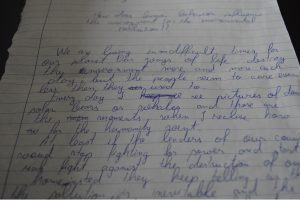
The idea was to organize a competition based on creative writing in the 12th grade. Of course thematically appropriate. So I thought about which topic could be interesting for the target group and how I could implement it. The topic was “How does human behavior influences the environment ( or the environmental pollution) ?”
I decided to leave it up to the students to choose which text form to use, so it could be an essay, a poem, a song or something like that. The idea was to give the students the plan so that each student could write something. One week after the writing I should go back to the same class to “award” the best text and go deeper in the topic.
So I went to school with this plan. I presented my idea to the students in the presence of the teacher and focused on the free choice of text. I think this was something new for the students. The focus, as mentioned above, is on non-formal education. I wanted the students to know that they could express themselves the way they wanted.
But (unfortunately) it went a bit different. While I was still explaining my plan, I was interrupted by the teacher who reminded the students how to structure an essay and remind them of the corresponding school lessons. She also told the students that they should substantiate their texts with many facts. I explained again that each student can express him- or herself as (s)he wishes. And that it will not evaluate with marks. So the students started writing and every student wrote something on his or her paper. I took the texts with me to read them. Contrary to my expectations, many students disregarded the teacher’s instructions and wrote very personal and poetic (regardless of a perfect structure) texts. Much to my delight.
The next week I went back to class to talk to the students about their texts. Unfortunately there was no real discussion and I decided to change the content of the lesson. I also decided not to award the best text.
Two things I learned during this activity or were a gain in knowledge for me:
1. I was very surprised by the content of the students’ texts. Most of the students drew a gloomy picture of the future in relation to the environment and seemed more or less helpless and powerless in their responsibility.
2. I and we propagate again and again a knowledge transfer based on non-formal education. Not only since our project, but for many years. I have found (and not only in this activity) that it is still new territory for teachers and that they find it difficult to implement or accept this form of education.
It’s no big surprise that some teachers have a hard time with these aspects. I think that the school system (not only in Romania!) is largely based on a clearly formal curriculum and this determines the everyday life and thinking of the teachers. So they are certainly very well educated in their field and know how to transport this knowledge in the way mentioned above.
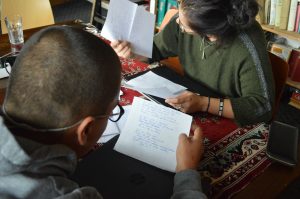
Nevertheless, I and we try to implement other aspects of education, not only the mediation, but also the contents into the everyday school life.
Fortunately, we have cooperations with the schools in the area and can slowly but surely introduce a different kind of mediation. Not to replace the teachers, but to supplement them!
Schimb de Tineri în Sicilia / testimoniale participanților
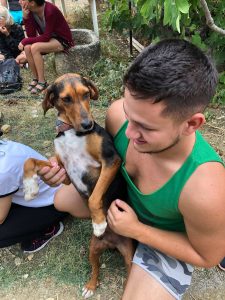 În prima săptămână a lunii septembrie, o echipă formată din 5 tineri din Curba de Cultura s-a alăturat unui schimb de tineret Erasmus + la Polizzi Generosa, în inima Siciliei. HeritAge, un schimb dedicat împărtășirii de practici despre construcția naturală a fost organizat de noii noștri parteneri sicilieni, Porto di Terra. Iată cum au descris tinerii noștri această experiență specială în inima naturii:
În prima săptămână a lunii septembrie, o echipă formată din 5 tineri din Curba de Cultura s-a alăturat unui schimb de tineret Erasmus + la Polizzi Generosa, în inima Siciliei. HeritAge, un schimb dedicat împărtășirii de practici despre construcția naturală a fost organizat de noii noștri parteneri sicilieni, Porto di Terra. Iată cum au descris tinerii noștri această experiență specială în inima naturii:
“Despre această nouă experiență pot spune că a fost unică cu noi oameni cu caractere diferite. Am trăit experiența de a construi acoperișul unei “paglaio” folosind doar materiale naturale “cannedda” și “tisa”, și de a consolida pereții unei alte “paiaio” folosind din nou doar materiale naturale, lut nisip apă fan pământ galben”. Pentru mulți dintre noi a fost o experiență nouă în care am interacționat direct cu locul cu materialele absolut cu toată natură, iar cu siguranță pentru mine a fost prima dată când am interacționat direct doar cu materiale naturale chiar dacă știam de existența și folosirea lor. Am experimentat un nou stil de viață în care am dormit toată perioada proiectului în cort, am experimentat mâncărurile tradiționale dar într-o varianta vegetariană descoperind posibilitatea de a adopta un nou stil de alimentație. După o drumeție de aproape 5 ore în munții sicilieni am rămas cu imaginea unei familii de căprioare care conviețuiau împreună cu o familie de porci mistreți și bineînțeles cu imagini ale peisajului de neuitat. După vizita celui mai apropiat orășel de camping-ul nostru am rămas cu detalii despre istoria orășelului cum a fost construit, cum majoritatea persoanelor tinere l-au părăsit treptat, cum majoritatea bisericilor au fost transformate în case. În ultima seară a proiectului ne-am luat rămas bun de la loc de la toți noii noștri prieteni făcuți pe parcursul schimbului, pe ritmuri de muzică tradițională cântate de invitații noștri locali pentru a celebra noul acoperiș și noua imagine a pereților din casele naturale.” – Alex
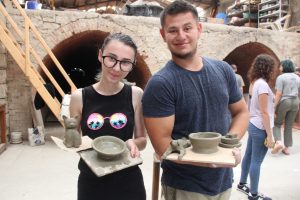 “Unul dintre cele mai importante aspecte ale acestui schimb de tineri a implicat bucuria și vibe-ul pozitiv pe care îl pot produce lucrurile simple. Într-o societate care pune accent pe ideea de a aprecia cât mai mult partea materială, am întâlnit aici, la Porto di Terra comuniunea perfectă între om și natură. O adevărată atmosfera relaxată și relaxantă, oameni mereu zâmbitori și înțelegători. Împreună cu tinerii din Spania, Italia, Portugalia, Slovacia și Grecia am adunat și pregătit materialele necesare, am reconstruit două dintre casele tradiționale, denumite Pagliaio și am explorat frumusețile parcului național Maddona printr-o vizită în orașul Polizzi Generossa și în special printr-o drumeție pe munte. Schimbul de tineri s-a încheiat cu dans, muzică live tradițională și multă bucurie pe fețele tuturor.” – Simina
“Unul dintre cele mai importante aspecte ale acestui schimb de tineri a implicat bucuria și vibe-ul pozitiv pe care îl pot produce lucrurile simple. Într-o societate care pune accent pe ideea de a aprecia cât mai mult partea materială, am întâlnit aici, la Porto di Terra comuniunea perfectă între om și natură. O adevărată atmosfera relaxată și relaxantă, oameni mereu zâmbitori și înțelegători. Împreună cu tinerii din Spania, Italia, Portugalia, Slovacia și Grecia am adunat și pregătit materialele necesare, am reconstruit două dintre casele tradiționale, denumite Pagliaio și am explorat frumusețile parcului național Maddona printr-o vizită în orașul Polizzi Generossa și în special printr-o drumeție pe munte. Schimbul de tineri s-a încheiat cu dans, muzică live tradițională și multă bucurie pe fețele tuturor.” – Simina
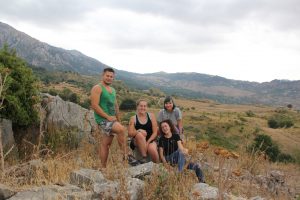 “Heritage”…un Youth Exchange într-o altă lume,un schimb care m-a rupt de realitate și care mi-a dat o bună lecție de viață. Subiectul acestui schimb a fost despre construcțiile din materiale naturale. Campingul a fost într-o pădurice, mâncarea a fost vegetariană,din produse naturale crescute în grădina organizatorilor. Am învățat să construim pagliaio, o căsuța pe care foarte puțini oameni mai știu să o facă. Acoperișul constă din mănunchiuri de disa și cannedda, iar pereții dintr-un amestec făcut din paie,pământ galben și nisip cu calcar. Într-una din zile am vizitat satul Polizzi Generosa căruia i-am descoperit istoria și un atelier de lucru în lut unde am fost lăsăți să experimentăm tainele lutului. O altă zi a fost dedicată urcatului pe munte. Până în vârf am întâlnit căprioare și porci mistreți. În ultima zi am celebrat terminarea construirii casei “pagliao”. Subiectul schimbului și-a atins scopul foarte bine și pe lângă acesta ne-am distrat în timp ce munceam, am învățat să lucrăm în echipa și am învățat să apreciem natura,să ii vedem frumusețea în toată splendoarea ei. Mi-am înfrânt multe temeri peste care nu mă așteptăm sa trec. Din acel stil natural de viață am primit niște lecții care mă vor ajută în viață de zi cu zi.” – Andreea
“Heritage”…un Youth Exchange într-o altă lume,un schimb care m-a rupt de realitate și care mi-a dat o bună lecție de viață. Subiectul acestui schimb a fost despre construcțiile din materiale naturale. Campingul a fost într-o pădurice, mâncarea a fost vegetariană,din produse naturale crescute în grădina organizatorilor. Am învățat să construim pagliaio, o căsuța pe care foarte puțini oameni mai știu să o facă. Acoperișul constă din mănunchiuri de disa și cannedda, iar pereții dintr-un amestec făcut din paie,pământ galben și nisip cu calcar. Într-una din zile am vizitat satul Polizzi Generosa căruia i-am descoperit istoria și un atelier de lucru în lut unde am fost lăsăți să experimentăm tainele lutului. O altă zi a fost dedicată urcatului pe munte. Până în vârf am întâlnit căprioare și porci mistreți. În ultima zi am celebrat terminarea construirii casei “pagliao”. Subiectul schimbului și-a atins scopul foarte bine și pe lângă acesta ne-am distrat în timp ce munceam, am învățat să lucrăm în echipa și am învățat să apreciem natura,să ii vedem frumusețea în toată splendoarea ei. Mi-am înfrânt multe temeri peste care nu mă așteptăm sa trec. Din acel stil natural de viață am primit niște lecții care mă vor ajută în viață de zi cu zi.” – Andreea
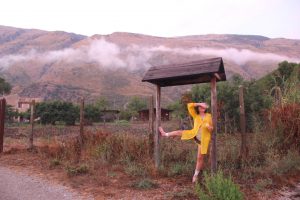 “Probabil primul Schimb de Tineri din experiența mea când am făcut cu adevărat un schimb. Am învățat mult prin lucrări practice, luând informații și povești și, de asemenea, de la modelele pe care le-am găsit între oamenii cu care am petrecut săptămâna aceasta. Am lăsat acolo mica mea contribuție la pagliaio (casele tradiționale siciliene) și am primit atât de multe: cunoștințe despre natură și puterea ei, noi prietenii, „cea mai bună mâncare pe care o vei mânca vreodată” și prima mea reprezentație live, am cântat singura jumătate dintr-un cântec pe care îl pot cânta la chitară și a însemnat foarte mult pentru mine. Sunt recunoscătoare pentru această săptămână diferită din viața mea și pentru toate ființele uimitoare pe care le-am cunoscut, inclusiv câinii și țânțarii. ”(Citiți în timp ce ascultați https://youtu.be/Op0dN_U4L5s) – Laura
“Probabil primul Schimb de Tineri din experiența mea când am făcut cu adevărat un schimb. Am învățat mult prin lucrări practice, luând informații și povești și, de asemenea, de la modelele pe care le-am găsit între oamenii cu care am petrecut săptămâna aceasta. Am lăsat acolo mica mea contribuție la pagliaio (casele tradiționale siciliene) și am primit atât de multe: cunoștințe despre natură și puterea ei, noi prietenii, „cea mai bună mâncare pe care o vei mânca vreodată” și prima mea reprezentație live, am cântat singura jumătate dintr-un cântec pe care îl pot cânta la chitară și a însemnat foarte mult pentru mine. Sunt recunoscătoare pentru această săptămână diferită din viața mea și pentru toate ființele uimitoare pe care le-am cunoscut, inclusiv câinii și țânțarii. ”(Citiți în timp ce ascultați https://youtu.be/Op0dN_U4L5s) – Laura
5 things when you are living in a rural area in Romania.
The house :
If you have a light sleep, it’s 5 am and you wake up because the rooster from the farm next door thought it would be a good idea to start the day at that time. Otherwise it’s 9 am and it’s time to get up.
First step, the bathroom. Living in a typically traditional house, this one isn’t really at the cutting edge of technology. If you are in winter, it’ll probably be very cold. It’s therefore strongly recommended to buy a small auxiliary heater. It’s also possible that you have no water but no panic, usually you’ve at best 30 minutes to wait and at worst 4 days. This often happens after a lot of rain, so take your precautions!
Once this step is completed, you should know that toilet paper don’t go into the toilet but into the next bin.
You should also know that in this type of house, there’s no centralized heating. You’ll therefore have to make a fire in each room if you want your house to be heated. For that you will obviously have to cut wood and dry it otherwise it will not take.
Despite all this, life in a traditional house is a very relaxing thing, life is simple and it’s very pleasant to wake up for example with a view of the mountains and a beautiful sunrise.
The transport service :
In Romania, in rural areas, transport isn’t very efficient. Sometimes you only have 2 or 3 buses during the day. It’s also true that trains are rather slow. So if you want to get somewhere as soon as possible, the best way is still to hitchhike. As everywhere it’s always advisable not to do it alone, but it’s always the easiest way to get from point A to point B.
However, if you want to take your time and enjoy your trip, I strongly recommend the train. You’ll have the opportunity to enjoy the wonderful landscapes that Romania has to offer. You’ll also meet many great people who will be happy to help you on your journey.
The language :
Being in another country it’s normal that you do not speak the same language. Romanian is a Latin language and has a lot of similarities with French, for example, so you can always try to make yourself understood. In rural areas, very few people understand and speak English, so it’s strongly recommended to learn a few words that will be useful to you such as: count to 10; say hello; or ask for directions. No matter how many mistakes you make, the person you’re talking to will usually be very happy if you make the effort to speak their language. So don’t hesitate to get started!
The shopping :
Generally in small villages, you can find many small shops. You can find the essentials there. It’s very convenient when you’re missing something. The disadvantage is that very few of them take the card. You will therefore constantly need to have change with you just to be sure.
What is also good in Romania are the “Second Hands Shops”. There are some everywhere and you can really find great and cheap things. In an average city there are usually at least 4-5 of them and if you’re in a small village just look around and you will certainly see at least one. Again, they do not normally take the card or so rarely fill up with change.
The food :
You can’t go to a country without tasting traditional food. There are many very different dishes but the main ingredient will often be meat. For a Romanian person a meal isn’t a real meal without meat. Even if you can eat meatless dishes like Mămăligă or Sarmale, which are made of corn and cabbage respectively.
Don’t hesitate to visit one of these small open markets to taste Mici and find fresh and local produce. During this short outing you will also see people selling alcohol in water bottles. These are Pălinca and Țuică, traditional alcohols made from fermented fruit (usually plumbs).
In Romania, you also have some special bakeries. Indeed, you can’t really get into it but you have to order what you want at a small window. Some are specialized in the sale of sweet products and others in salty products.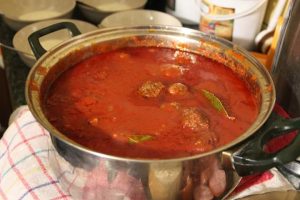
In short, don’t be afraid to make new experiences, you’ll be pleasantly surprised. Romania is a beautiful and welcoming country!
Discovering Romanian culture –
The topic of the following article is « Discovering the romanian culture ». In here, I would like to talk about what I felt as differences from France in Romania, considering the culture as a set of patterns gathering specific beliefs, behaviours, language, method of production … shared by people constituting a specific society this way. Living in Schiulesti, in Izvoarele commune, I experiment far more the rural Romania than the urban one. And talking about way of living, it seems to make a big difference. However, I’d like to specify the fact that I don’t speak romanian, what does not help to create a contact with the neighbourhood. In Schiulesti for example it is rare to find someone who speaks English. It is a rural area specificity I guess, in Bucharest almost everybody speaks English. What I mean is that my first personal observations are maybe not this significant because of not enough dialogues with natives.
First I’d like to talk about something which surprised me: paradoxical feelings some Romanian have toward their country being both proud and ashamed. In the streets, both in where we live and in Bucharest we can see Romanian flags hung on a balcon or in the garden what only happens during the football world cup in France, especially when the french team win! In Schiulesti, many people talk about the beauty of the landscapes surrounding the village, and more generally the inhabitants seem interested in sharing traditions such as preparing sarmale for Christmas. Sometimes this pride seems to be extreme, expressed by a strong feeling of patriotism and especially with a bipolar vision dividing still the world between west and east as if the cold war never finished. Indeed, we’ve already had dialogues turning into conflict just talking about our studies in France, we felt then this resentful we can find in here toward the west. Also, this strong expression of patriotism is often shared with a discriminatory vision of the society rejecting both gypsies, homosexuals, more generally the minorities. If those people want to remain in Romania forever and ever, there are others who express easily shame toward Romania. For example, when we said to a cashier we enjoyed our life in here she laughed at us saying « Are you kidding ? » Many young people sound to want to go abroad, and do not see their future in the country according to little interviews we did on our On Arrival Training (OAT) in Bucharest. For many, that decision to go abroad seems obvious. As if the future was abroad. But when in many rich countries such as France, more and more thinkers talk about the necessity to consume less, the necessity of economic decrease not only for the planet but for the entire society, maybe Romania is in some ways ahead of his time, especially in the rural areas.
In here, the rythm is totally different from the one in the cities. In Schiulesti there are around four bus per days during the week. No bus the week end. There are little shops in which you can only pay by cash. In most of the houses, there are no central heating system, it’s doing fire you warm the rooms. You don’t have fancy devices to cook or to cut the grass. But even if there is no bus, no car, no Nespresso machine to prepare the coffee, no George Clooney neither, you find ways to do what you have to do and that with the help of people. You need to go to the city ? You can easily find a car which is also going to Valenii de Munte, people very often stop for hitchhikers, it’s usual. It maybe sounds nothing but I think it’s far different from a usual mind of consumer : it is a smart, solidar and simple way of thinking : how can we cultivate the garden with the tools we have ? How can we cook with the ingredients left ? How can we make the house more attractive with what there is in the attic ? And adopting this point of view, you realise the wealth you have around you because of the garden, because of the well, because of people with big knowledge about nature… The relationship with the nature seems to me also different from the one I knew. For example, in the village we see many cows/ chicken/ horses walking freely. In the same time animals seems to be considered in a functionnal way, as tools with the horses carrying wood from village to others or dogs chained to protect the house but people often let them walking on the streets especially the week-end. As if their owners trust their animals enough to let them go freely. They look confident about that when in France animals are always locked up. I’d like to be able to have a dialogue in romanian to speak with the neighbourhood in here. There is a community spirit, everybody greets you and many want to talk with you even if you tell them that you can not speak romanian. What is frustrating ! The community is also cohesive because of the religion. Almost everybody makes the sign of the cross in the bus when we meet a church and there are many orthodox churches around !
The community I was talking about seems to me particularly conservative because of different observations we can do. As I said, the religion seems still very important because of the cross signs, religious celebrations such as Eastern, prepared way ahead and even in the schools, the marriage remaining something very important in here… What’s more there is apparently a big gap between female and male roles with places with men only such as the bar we have in Schiulesti, main place of socialization, the same with the places to drink in Izvoarele village. During the weekend we can see women gathered in front of their houses, talking together on benches when men are in the bar. This conservative seems also present in school with quite strict teachers, with strong vertical relationship and education by exclusion of children who are not in the norm : with disabilities, with family issues…
To conclude, I’d like to share my personal feelings about these first months I spent in here, living in Izvoarele commune. There are for sure bias in my perception because I am in here as a volunteer for Curba de Cultura and living with other international volunteers I don’t really share life conditions/habits/rythm natives have but the environment in here is very quiet I guess because of the wonderful landscapes we have around but also because of a slower countryside rythm which makes you slowing down in your own mind also. What’s more, people in here welcome us even if we have obvious different way of thinking/ way of life and even with the language gap, they want to meet us, to greet us. What makes our time in here very pleasant.
/RO/
Subiectul următorului articol este Descoperirea culturii române. Aici, aș vrea să vorbesc despre ce am simțit ca diferențe din Franța, în România, considerând această cultură ca un set de modele care adună convingeri specifice, comportamente, limbă, metode de producere… transmise de oameni, constituind astfel o societate specifică. Locuind în Schiulești, în comuna Izvoarele, am experimentat mult mai mult partea rurală a României, decât cea urbană. Și vorbind despre felul de a trăi, întâlnim o mare diferență. Oricum, trebuie să specific că eu nu vorbesc limba română, iar acest lucru nu ajută la crearea unui contact cu vecinii. În Schiulești, de exemplu, este rar să găsești o persoană care vorbește limba engleză. Cred că este o zonă rurală specifică, în București aproape toată lumea vorbește engleză. La ce mă refer este faptul că primele mele observații nu sunt atât de semnificative, deoarece nu am purtat dialoguri îndeajuns cu nativii.
Pentru început, aș vrea să vorbesc despre ceva ce m-a surprins: paradoxalul sentiment al românilor față de țara lor, fiind atât de mandri și rușinoși în același timp. Pe străzi, în ambele locuri unde locuim, în București, putem vedea steagul României fluturând pe balcon, în grădină, iar acest lucru îl întâlnim în Franța doar în timpul meciului de fotbal pentru cupa mondială, în special când echipa franceză câștigă! În Schiulești mulți oameni vorbesc despre frumusețea peisajelor înconjurătoare, iar în general locuitorii sunt interesați să transmită tradițiile, cum ar fi prepararea sarmalelor pentru Crăciun. Uneori, această sarbătoare pare a fi extremă, exprimată printr-un sentiment puternic de patriotism și în special cu o viziune bipolară, împărțind lumea în vest și est, ca și cum Războiul Rece nu s-ar fi terminat încă. La fel, deja am purtat discuții contradictorii despre studiile noastre din Franța, apoi ne-am simțit ofensați de ce am găsit aici, în zona vestică. Totodată, acest puternic sentiment de patriotism este transmis des din prisma viziunii discriminatorii despre societate excluzând țiganii și homosexualii, în general minoritățile. Dacă acești oameni ar vrea să rămână în România pentru totdeauna, sunt alții care își exprimă ușor rușinea față de țară. De exemplu, când noi îi spunem unei vânzătoare că ne bucurăm de viața de aici, ea râde și spune „ – Voi glumiți?” Mulți tineri sunt tentați să meargă în străinătate, deoarece nu reușesc să-și vadă propriul viitor în țară, în conformitate cu scurtele interviuri pe care le-am realizat în cadrul OAT (Curs de formare la sosire), București. Pentru mulți, aceea decizie de a pleaca în străinătate pare singura opțiune. De parcă viitorul ar fi fost deja în străinătate. Atunci când în majoritatea țărilor dezvoltate, asemenea Franței, din ce în ce mai mulți intelectuali vorbesc despre necesitatea consumului redus, necesitatea descreșterii economice este importantă nu doar pentru planetă, dar și pentru întreaga societate, poate România este în frunte în unele părți de această dată, în special în zonele rurale.
Aici, ritmul este total diferit de cel din oraș. În Schiulești există în jur de patru autobuze pe zi în timpul săptămânii. Nici un autobuz în weekend. Sunt magazine micuțe în care poți plăti doar cash. În majoritatea caselor nu există încălzire centrală, se face focul pentru a încălzi camerele. Nu ai dispozitive fantastice pentru a găti sau pentru a tăia iarba. Dar chiar dacă nu există nici un autobuz, nici o mașinărie Nespresso care să pregătească cafeaua, nici George Clooney, găsești modalități de a face ceea ce trebuie să faci și asta cu ajutorul oamenilor. Ai nevoie să te duci în oraș? Poți să găsești ușor o mașină care merge de asemenea spre Vălenii de Munte, oamenii opresc des pentru autostopiști, este ceva obișnuit.
Poate nu vă sună nimic, dar eu cred că gândirea este cu mult diferită de cea obișnuită a consumatorului: este un mod de gândire inteligent, solidar și simplu: cum putem cultiva grădina cu uneltele pe care le avem? Cum putem găti cu ingredientele rămase? Cum putem face casa mai atractivă cu ceea ce există în pod? Și prin adoptarea acestui punct de vedere, îți dai seama de bogăția pe care o ai în jurul tău datorită grădinii, datorită fântânii, datorită oamenilor cu mari cunoștințe despre natură… Relația cu natura mi se pare, de asemenea, diferită de cea pe care am știut-o. De exemplu, în sat vedem multe vaci/ pui/ cai care merg liber. În același timp, animalele par a fi considerate într-o manieră funcțională, cum ar fi uneltele, caii care transportă lemn din sat în altele sau câinii legați pentru a proteja casa, dar oamenii le lasă de multe ori să meargă pe stradă, în special la sfârșitul săptămânii. Ca și cum proprietarii lor ar avea încredere în animalele lor suficient pentru a le permite să meargă libere. Ei par a fi încrezători, pe când în Franța animalele sunt întotdeauna închise. Aș vrea să pot avea un dialog în limba română pentru a vorbi cu vecinii de aici. Există un spirit comunitar, toată lumea te salută și mulți vor să vorbească cu tine, chiar dacă le spui că nu poți vorbi în limba română. Ceea ce este frustrant! Comunitatea este, de asemenea, coezivă datorită religiei. Aproape toată lumea face semnul crucii în autobuz, când întâlnim o biserică… și există multe biserici ortodoxe în jurul nostru! Comunitatea despre care vorbeam pare a fi extrem de conservatoare din cauza unor observații diferite pe care le putem face. Așa cum am spus, religia pare a fi încă foarte importantă din cauza semnelor, a sărbătorilor religioase, cum ar fi cea de Paște, pregătită înainte și chiar în școli, căsătoria rămâne ceva foarte important aici… În plus, există un mare decalaj între rolul femeilor si al bărbaților, cu locuri numai pentru bărbați, cum ar fi cârciuma pe care o avem în Schiulesti, locul principal al socializării, la fel ca și locurile de băut din satul Izvoarele. În timpul săptămânii observăm că femeile s-au adunat în fața casei lor, vorbind împreună și stând pe bănci, atunci când bărbații se află la bar. Acest lucru conservator pare, de asemenea, prezent în școală, cu profesorii destul de stricți, cu o puternică relație de verticalitate și educație, prin excluderea copiilor care nu se află în normă: cu dizabilități, cu probleme de familie…
În concluzie, aș dori să împărtășesc sentimentele mele personale despre aceste prime luni petrecute aici, pe care le trăiesc în comuna Izvoarele. Există o anumită părtinire în percepția mea, deoarece sunt aici ca voluntar pentru Curba de Cultură și trăiesc împreună cu alți voluntari internaționali. Nu prea îmi împărtășesc condițiile de viață/ obiceiurile/ ritmurile native pe care le am, dar mediul înconjurător aici este foarte liniștit. Cred că datorită peisajelor minunate pe care le avem în jur, dar și datorită ritmului mai redus al vieții de la țară, te fac să-ți liniștești mintea. În plus, oamenii de aici ne întâmpină bine, chiar dacă avem un mod diferit de gândire/ mod de viață diferit și chiar și cu decalajele de limbă, vor să ne întâlnească, să ne salute. Ceea ce face sejurul nostru de aici foarte plăcut.
Caroline este în România pentru o perioadă de șase luni, din martie 2019 până în august 2019, în cadrul proiectului Voluntary Generation [2017-2-FR01-KA105-013326] proiect co-finanțat de Uniunea Europeană prin Programul Erasmus+ și implementat în România de către Curba de Cultură.
Ruralympics, the first youth festival in Prahova | Ruralympics – primul festival de tineret din Prahova
Th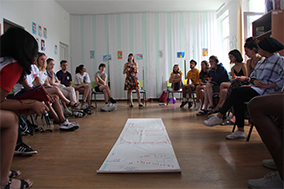 ings are moving in Prahova! With the help of local youngsters, a cosmopolitan group of young volunteers is working hard on the ambitious undertaking to organize the first rural youth festival of the county: the Ruralympics.
ings are moving in Prahova! With the help of local youngsters, a cosmopolitan group of young volunteers is working hard on the ambitious undertaking to organize the first rural youth festival of the county: the Ruralympics.
Lucrurile se mișcă în Prahova! Cu ajutorul tinerilor din zonă, un grup cosmopolit de tineri voluntari lucrează din greu la organizarea unui ambițios și prim festival rural de tineret din județ: Ruralympics.
Coming from 19 different countries, they’re taking part in this Romanian project thanks to the European Solidarity Corps, which supports European mobility and encourages volunteering actions. Motivated and willing to put their skills at the service of the region’s development, they’re working with the non-governmental organization Curba de Cultură. It focusses on improving education levels and on the community engagement for the young people living in rural environm ent, but also on the personal and professional development of the volunteers. Either in charge of budget, logistic, promotion or coordination and hosting, they have the opportunity to improve their skill and to learn new competences by organizing this big event.
Venind din 19 țări diferite, ei sunt parte din acest proiect mulțumită Corpului European de Solidaritate, programul care sprijină mobilitățile europene și încurajează acțiunile de voluntariat. Movitați și dornici să își pună abilitățile în serviciului dezvoltării regiunii, ei lucrează împreună cu organizația neguvernamentală Curba de Cultură. Focusul lor este îmbunătățirea nivelului educațional în ce privește implicarea comunității pentru a sprijinii tinerii din mediul rural, dar și dezvoltarea personală și profesională a voluntarilor. Fie că e vorba de buget, logistică, promovare, coordonare și găzduire, aceștia au ocazia să îți îmbunătățească abilitățile și să adune noi competențe organizând acest eveniment.
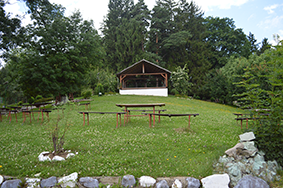
Taking place in the lovely park of Schiulești, among the trees and the hills, it will start the 2nd of august, at 10:00 am, and finish the 4th, at 23:00. Open to everyone, the aim is to promote rural life and its good sides. For this, you will be able to take in typical everyday activities of the region, such as milking a cow or participating in a woodcutting contest with Stihl Timbersports®.
Ruralympics are loc în frumosul parc din Schiulești, printre arbori și dealuri și va începe de la 10.00 dimineața pe 2 august și se va încheia la 23.00 pe 4 august. Este deschis pentru toată lumea, iar scopul festivalului este să promoveze viața la țară și avantajele ei. Pentru acestea participanții vor putea participa la activități de zi cu zi din regiune, precum mulsul vacii ori să ia parte la o competiție de tăiat lemne împreună cu Stihl Timbersports®.
In the program, a lot of fun; mini-games, sport activities, face painting, treasure hunt, dance workshop, open mic, mamaliga Master Chef, opportunity fair and much more! So if you want to spend good time in a very friendly atmosphere, among wonderful surroundings, and have a glimpse or rural life, this is the place to be!
În program avem multă distracție, mini-jocuri, activități sportive, vânătoare de comori, desene pe față, ateleir de dans, microfon la liber, mămăliga Master Chef, târg de oportunități și încă multe altele! Deci, dacă vrei să te simți bine într-o atmosferă prietenoasă, într-o zonă frumoasă și să guști măcar un pic din viața la țară, acesta e locul unde trebuie să fii!
Comunicat de presă – RURALYMPICS
Comunicat de presă
29 Iulie 2019
RURALYMPICS
Ruralympics, primul festival rural pentru tineret din România, este în curs de pregătire!
Ruralympics (Rural Olympics) este un eveniment de trei zile plin de provocări creative în diverse discipline bazate pe cultura rurală și a luat naștere în inima județului Prahova, fiind co-creat cu ajutorul unei echipe interculturale de tineri.
Festivalul a fost gândit cu scopul de a prezenta și recompensa abilități ce derivă din viața satului, și de a scoate în evidență partea distractivă a mediului rural. Ne dorim să creăm un context pentru localnici să se întâlnească și să petreacă timp de calitate împreună, construind astfel un sentiment de comunitate. Vrem să arătăm așadar potențialul acestui tip de activități pentru dezvoltarea comunitară, ele fiind benefice prin crearea unui cadru ce stimulează cooperarea, convivialitatea și inovația.
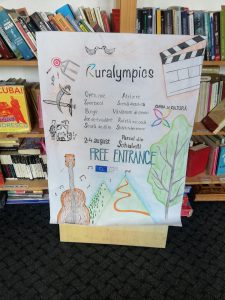
Trailer promo AICI.
Pe tot parcursul celor trei zile de festival vor decurge în paralel o serie de activități ce se vor afla în continuă desfășurare precum jocuri tradiționale, ateliere, jocuri sportive, concert cu muzicieni locali și spectacole de dans, schimb de obiecte, concursuri și multe altele! Deși focusul evenimentelor este pe tineri, vom avea câte ceva pentru toată lumea, indiferent de vârstă, așa că nu ezitați să veniți cu toată familia sau grupul de prieteni și să participați la jocuri, să vă uitați la cinema în aer liber sau să petreceți niște timp în locurile special amenajate unde puteți bea ceva rece și vă puteți relaxa.
Dintre activitățile pe care inițiativa le va pune la dispoziție putem enumera: competiție de tăiat lemne, de gătit, de dat cu sapa și de curățat legume; jocuri de evadare și vânătoare de comori; karaoke; diverse jocuri individuale și de echipă, mini-jocuri, jocuri de masă, jocuri cu hârtie, precum dixit, oina, concurs de avioane de hârtie, ȚOMAPANT și muulte altele. Avem și multe premii pregătite!
Sâmbătă vom avea și un târg de oportunități, acesta constând într-un stand cu materiale informative pentru tineri unde aceștia pot afla diverse opțiuni privind programe de voluntariat, formare, training, internship și alte modalități de dezvoltare personală și profesională, atât la nivel național cât și internațional.
Duminică, în cea de-a treia zi de festival, vom avea o scenă deschisă oricui (open mic), așa că dacă vă place să cântați sau dansați, să spuneți bancuri, să faceți stand-up, sau aveți alte talente sau abilități pe care ați vrea să le împărtășiți cu ceilalți, vă așteptăm (la fața locului sau printr-un mesaj în care vă manifestați interesul pentru activitate)!
Festivalul va avea loc în Parcul Schiulești al comunei Izvoarele și se va desfășura între 2 și 4 august, începând cu ora 10 și până în jurul orelor 22 – 23. Intrarea este liberă!
Detaliile și programul sunt în curs de actualizare, așa că fiți cu ochii în patru pe pagina evenimentului, AICI!
Ruralympics este un eveniment organizat de echipa de inițiativă a proiectului SUS (Suit ‘Ur Summer), cofinanțat prin programul Corpul European de Solidaritate, fiind un proiect de solidaritate la nivel local, care sprijină activitățile gestionate de tineri pentru tineri. Acest eveniment și multe altele care vor urma pe parcursul verii, sunt pregătite de Ion, Andreea, Simina, Oana, Diana, Kristina și Sorin cu ajutorul echipei de voluntari internaționali și locali.
Curba de Cultură este o organizaţie neguvernamentală, nonprofit, dedicată învăţării nonformale, culturii şi oportunităţilor de participare ale tinerilor din mediul rural din România. Scopul asociaţiei este de a revitaliza mediul rural din România. Misiunea Curbei de Cultură este să contribuie la dezvoltarea adolescenţilor şi tinerilor ca parte integrantă din comunităţile în care trăiesc, folosind educaţia nonformală ca sistem complementar sistemului formal de educaţie.
5 favorite outdoor games from my childhood that anyone can play
When I was young, I was scout. We spent a lot of time outdoor to play at several game.
Some of them are engraved in my mind like these 5:
- ” The bandmaster “
Everybody is in a circle. We choose one who will be “ the detective “. His goal is to find the bandmaster who is hidden among the musicians. The detective goes out of the circle to not see when the group choose ” the bandmaster “. The goal of the bandmaster is to do some movements that all the group follows, anything he wants without being spotted by the detective. He can change the movement when he wants but with care so the detective won’t see him!
The game starts, the bandmaster does a movement and everybody reproduces it. The detective comes back in the circle and tries to find the bandmaster. When he finds him, the game ends and we can restart with two other people.
- ” The mouse and the cat “
Everyone is in pairs, dispersed all over in the room/field and all of them are mice. Two participants are alone. One is the cat, the other one is also a mouse. The goal of the cat is to touch the mouse. Like this the mouse becomes the cat and vice-versa. To not be caught, the mouse needs to find a partner. For that he goes next to a couple and grabs the arm of the person just next to him. As it’s impossible to be three in a pair, the one at the opposite end needs to leave and start to run to not be caught by the cat. The game ends whenever loose interest.
- ” The king of the silence “
Everybody is in a circle, sitting or standing, it doesn’t matter. One person is “the king of the silence”, he’s sitting in the middle of the circle, eyes closed, trying to protect his treasure that is placed around the king (or under if he’s on a chair). The goal of the other people in the circle is to take the treasure. In order to do that, one by one, they go in silence to try to take it. If they do too much noise, the king is able to point them with his finger and they need to go back to their place. The game ends when the king’s treasure is stolen. The person who stole it becomes the new king and the game restarts.
- ” The wizards “
In this game, we have some wizards and the others are muggles. The goal of the wizards is to catch the muggles. When they touch them, the muggles petrify and cannot move anymore. The game ends when all muggles are petrified. But they’re able to be healed, if another muggle touches them and frees them.
- “The little goldfish”
In this game, there is a little goldfish standing in front of the others.
The goal of the other child is to get in line with him (a few meters away) and to try to cross the other side without getting touched. If they get touched, they become small goldfish and join the first fish. To do this, the children must shout: “Little goldfish, can we cross the Red Sea, if we have …?” And the little goldfish has to find a color that no one has to be able to touche a maximum of people. If someone has the color that the little goldfish has mentioned before, he can pass without fearing anything. But if a person doesn’t have the color she will have to run to try to pass the other side of the sea. The game ends when everybody is a little goldfish.
How can technology help to reduce waste?
According to ONU the world population will reach 8.3 billions people in 2030 with an increase of 1 billion people in 13 years. In all of the challenges of a massive increase of the population the increase of waste is one of the biggest. According to a scientific magazine “Science Advances” more than 13 billions tons of waste will be thrown at landfills and at the environment at 2050 if the rates of waste production keep the same.
This is major issue for our Planet Earth and for our own health. With so many tons of waste being produced every day over the entire globe the employes in this industry can not keep up with every trash that enters the center, for example the Sims Municipal Recycling Facility in Brooklyn is the largest recycling facility in the USA it receives around 800 tons of recycling material every single day so with this amount of trash its normal that human employees can’t keep up with everything therefore needing help from technology.
Ok when we think about technology we think about very complex things like flying cars but in this case technology can be as simple as huge magnet to separate metal from plastic. Yes of course there are more complex of using technology for example:
In 2010 in Japan a scientist by the name Akinori Ito developed a machine that turns plastic bags into oil basically the inverse process of how plastic bags are made. This machine is so revolutionary that during the process it does not release polluting gases to the environment is totally “Green”. This invention created in 2010 is capable of transforming 1kg of plastic bags into 1l of oil and it has been already sold to 80 countries
model of Akinori Ito machine
In my opinion in the future I thinks that this waste problem can be solved with a huge help of technology but i’m also afraid that we start to make drastic changes when its too late, we can’t only depend on technology to solve this problem we need to take measures as well. What do I mean with this? Recycling is one of the main option but not only check in your town there must be a kind of event to clean the streets, beaches. There nothing like that in your city? Why not creating your own? If we wait too much to start to do something regarding this topic it can be too late for the Earth and for us. We were given so much the only planet in the solar system with life. I mean, we are one in a million and I don’t wanna get too spiritual, but how are we not a miracle? We are perfectly positioned to the sun so we don’t burn but not too distant so we don’t turn to ice. As Richard Williams once said and I quote “Planet Earth is 4.5 billion years old. Mankind? About 140,000 years old. Let me put that in perspective. If you condense the Earth’s lifespan into 24 hours, that’s one full day, then we have been here on this planet for… three seconds.”
Three seconds and look what have we done, we call ourselves Homo sapiens aka wise man, but are we so wise? Wisdom is different.While intelligence speaks,wisdom listens and we covered our ears to mother nature screams and closed our eyes to all her “Help Wanted” signs. One thing i’m sure only if we do this together as humans we can make it to the fourth second.
“Empathy For Better Future” Youth Exchange opportunity
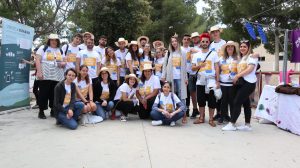
Have you ever thought about participating in a project that involves self development and discovering different people and their cultures?
That’s what we did last week and we would like to tell you more about this awesome experience!
Five different teams, from Bulgaria, Italy, Spain, Portugal and including our team from Romania, gathered in Alicante (Spain) for one week.
This experience was a youth exchange, an activity from the Erasmus+ program, during which we focused on empathy and other soft skills, such as teamwork, teambuilding, communication, social interactions as well as others.
Each of us got new skills and competences, as well as improved those we already had, based on activities using non-formal methods.
We developed our language skills by spending our time with 25 other people from different backgrounds and countries and by sharing our experiences with others.
For some of us, like Cătălin and Alex, this was the first time going in a mobility project, and so far it turned out to be a very empowering experience.
Cătălin: “It was awesome! Just the idea that you get in touch with a lot of people from different countries and get to work together on projects was for me an impulse. You begin to know each other very well and of course to know yourself and to develop skills that maybe were not that improved. ”
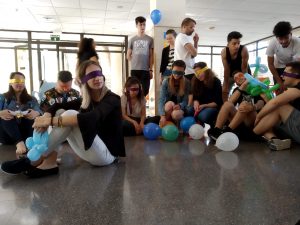
Alex:” We had the opportunity to improve the knowledge of English on a safe environment, and to met new people with different cultures and language so we learned how to work with them and how to have fun with them. We had an amazing week because it was all a new experience and because we saw some amazing places like Alicante and Barcelona and this was like a dream.”
And even if this project wasn’t the first for three participants of our national team, the general feeling is positive and let good results behind it.
Oana: “I for one really enjoyed one of the last activities we had – which was volunteering at a festival here in Alicante for a few hours. I’ve always enjoyed volunteering and I do it a lot in Romania, but doing it abroad felt particularly stimulating and fun. It was a really great experience to feel as part of the community even while being in another country, which further deepened my belief that we are all similar and we can always come together even while being so diverse or sometimes not even speaking the same language. ”
Estelle: “This week was a great opportunity to get new communication skills and to emphasize the empathy notion which is important in everyday life and working with young people. Even if it’s not my first experience, it’s always a strong and awesome opportunity to meet and discover new cultures, and also to create new connexions.”
Going in this kind of project is not only about learning about a topic you might be interested in, but also about having the opportunity to go abroad and discover new places while spending time with other people and having fun.
Our common advice would be: try to go out of your comfort zone and you would be more than grateful to be a participant of this kind of experience!
Te-ai gândit vreodată la cum ar fi să participi într-un proiect care implică dezvoltare personală și descoperirea a diferiți oameni și a culturii acestora?
Asta e ceea ce am făcut noi săptămâna trecută și am vrea să îți spunem mai multe despre această super experiență!
Pentru o săptămână, cinci echipe din diferite tari ale Europei (Bulgaria, Italia, Spania, Portugalia si România) s-au adunat în Alicante, Spania, cu scopul de a se cunoaste si relationa.
Experiența se numeste oficial “youth exchange” (schimb de tineri) si este o activitate a programului Erasmus+, în cadrul căreia ne-am concentrat pe empatie și alte “soft skills”, precum lucrul în echipă, teambuilding, comunicare si interacțiune socială.
Fiecare dintre noi a dezvoltat noi abilități și competențe, de asemenea, imbunatatind pe cele deja existente, sesiunile de invatare fiind bazate pe metode de educație non-formală.
Ne-am dezvoltate atat abilitățile lingvistice, prin prisma faptului ca ne-am petrecut timpul alaturi de alti 25 de oameni din țări cu istorie si traditii diferite, cat și abilitatile de relatioare si accceptare a diferentelor culturale, împărtășind experiențele personale cu ceilalti participanti.
Pentru unii dintre noi, precum Cătălin și Alex, aceasta a fost prima experienta de acest gen, într-un proiect de mobilitate, acesta dovedindu-se una de benefica si de neuitat.
Cătălin: “A fost super! Doar ideea că intri în contact cu o grămadă de oameni din țări diferite și ajungeți să lucrați împreună la proiecte a fost pentru mine un imbold in a-mi dori sa calatoresc cat mai mult. Începeți să vă cunoașteți foarte bine între voi și, desigur, să vă cunoașteți pe voi Înșivă. La finalul proiectului, mi-am dat seama, fara sa vreau, ca am mi-am imbunatatit abilitatile de comunicare, non-verbala, dar si in limba engleza, care poate nu erau atat de bine dezvoltate.”
Alex:” Am avut oportunitatea să ne îmbunătățim cunoștințele de limba engleză întru-un mediu unde ne simțeam în siguranță, și să cunoaștem oameni noi cu limbi și culturi diferite, așa că am învățat cum să lucrăm cu ei și cum să ne distrăm alaturi de ei. Am avut o săptămână minunată pentru că totul timpul nostru a fost presarat cu experiențe noi, dar si pentru ca am văzut locuri minunate precum Alicante și Barcelona. A fost ca un vis devenit realitate.”
Chiar dacă acest proiect nu a fost primul pentru trei dintre participanții echipei noastre naționale, sentimentul general e pozitiv și a lăsat în urmă rezultate bune.
Oana: “Mie personal cel mai mult mi-a plăcut una dintre ultimele activități pe care le-am avut – care a constat în a face voluntariat la un festival aici în Alicante pentru câteva ore. Întotdeauna mi-a plăcut să fiu voluntar și fac asta mult în România, dar să o fac înafara țării s-a simțit deosebit de stimulant și distractiv. A fost o experiență foarte plăcută să mă simt ca parte din comunitate chiar și aflându-mă în altă țară, ceea ce mi-a adâncit mai tare credința că suntem cu toții diferiti, dar similari in acelasi timp. Putem oricând să ne ajutăm unii pe altii, chiar daca locuim la mii de kilometrii departare, sau vorbim limbi diferite.”
Estelle: “Această săptămână a fost o oportunitate grozavă de a obține noi abilități de comunicare și de a pune accent pe noțiunea de empatie, ea fiind importantă în viața de zi cu zi precum și în lucrul cu tinerii. Chiar dacă nu e prima mea experiență, este întotdeauna o oportunitate minunată și puternică de a cunoaște și descoperi culturi noi, și de asemenea de a crea noi conexiuni.”
Participarea într-un astfel de proiect nu este numai despre a învața despre un subiect de care ai putea fi interesat, ci și despre a profita de oportunitatea de a calatori în străinătate și de a descoperi locuri noi, în timp ce petreci timp cu alte persoane și te distrezi.
Sfatul nostru comun ar fi: încearcă să ieși din zonă ta de confort și vei fi mai mult decât recunoscător să fii parte intr-un asemenea proiect!
